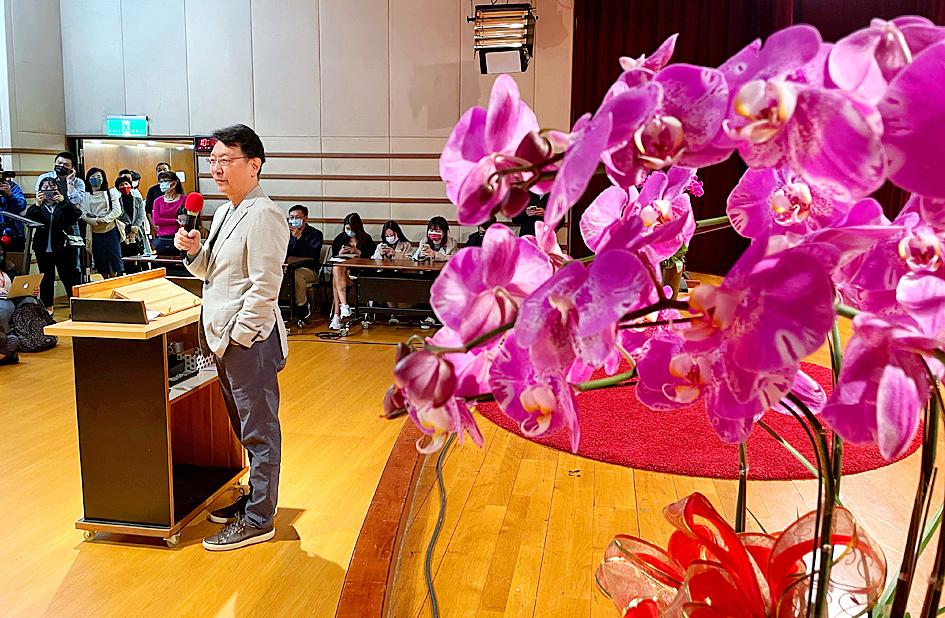Broadcasting Corp of China chairman Jaw Shaw-kong (趙少康) yesterday said that if he is elected president, he would push for a parliamentary system of government in his first year in office.
Jaw, a former lawmaker who in 1993 left the Chinese Nationalist Party (KMT) with several other members to form the New Party, rejoined the KMT earlier this month and has said that he plans to seek the party’s nomination to run in the 2024 presidential election.
At a news conference in Taipei yesterday to discuss his policy recommendations, Jaw said that oversight is the most important part of a democracy.

Photo: Liu Hsin-de, Taipei Times
“Our system is dominated by the president,” Jaw said.
The president “holds a lot of power, and there are no checks and balances,” he said.
“Although the US’ presidential system has flaws, at least the Congress and judiciary provide certain checks and balances,” he added.
Jaw listed Germany, Japan, Singapore and the UK as examples of democracies with relatively stable politics that have parliamentary systems.
He said that he is not the first person in the nation to propose a parliamentary system.
Different political parties have in the past proposed a parliamentary system while in opposition, but once they win the presidency, they “forget,” Jaw said.
“[President] Tsai Ing-wen (蔡英文) has three years left in office and cannot be re-elected. Why not push for a parliamentary system in that time?” Jaw asked, adding that it would help Tsai leave behind a good legacy.
Describing the parliamentary system as more inclusive, Jaw said that the “winner-takes-all” approach of the presidential system is unfair.
He said he hopes that Tsai would push for the implementation of a parliamentary system, but if she does not, he would promote a parliamentary system in his first year in office should he be elected president.
Jaw said that he also supports introducing absentee voting and giving 18-year-olds full voting rights, calling both “mainstream” policies globally.
He disclosed his proposal for a parliamentary system yesterday because proposals for constitutional amendments are set to be debated at the Legislative Yuan, Jaw said.
However, he later plans to speak on other issues, including cross-strait relations, Jaw added.

The Grand Hotel Taipei on Saturday confirmed that its information system had been illegally accessed and expressed its deepest apologies for the concern it has caused its customers, adding that the issue is being investigated by the Ministry of Justice Investigation Bureau. The hotel said that on Tuesday last week, it had discovered an external illegal intrusion into its information system. An initial digital forensic investigation confirmed that parts of the system had been accessed, it said, adding that the possibility that some customer data were stolen and leaked could not be ruled out. The actual scope and content of the affected data

‘LIKE-MINDED PARTNER’: Tako van Popta said it would be inappropriate to delay signing the deal with Taiwan because of China, adding he would promote the issue Canadian senators have stressed Taiwan’s importance for international trade and expressed enthusiasm for ensuring the Taiwan-Canada trade cooperation framework agreement is implemented this year. Representative to Canada Harry Tseng (曾厚仁) in an interview with the Central News Agency (CNA) said he was increasingly uneasy about Ottawa’s delays in signing the agreement, especially as Ottawa has warmed toward Beijing. There are “no negotiations left. Not only [is it] initialed, we have three versions of the text ready: English, French and Mandarin,” Tseng said. “That tells you how close we are to the final signature.” Tseng said that he hoped Canadian Prime Minister Mark Carney

POSITIVE DEVELOPMENT: Japan and the US are expected to hold in-depth discussions on Taiwan-related issues during the meeting next month, Japanese sources said The holding of a Japan-US leaders’ meeting ahead of US President Donald Trump’s visit to China is positive news for Taiwan, former Japan-Taiwan Exchange Association representative Hiroyasu Izumi said yesterday. After the Liberal Democratic Party’s landslide victory in Japan’s House of Representatives election, Japanese Prime Minister Sanae Takaichi is scheduled to visit the US next month, where she is to meet with Trump ahead of the US president’s planned visit to China from March 31 to April 2 for a meeting with Chinese President Xi Jinping (習近平). Japan and the US are expected to hold in-depth discussions on Taiwan-related issues during the

President William Lai (賴清德) yesterday bestowed one of Taiwan’s highest honors on Saint Vincent and the Grenadines (SVG) Ambassador Andrea Clare Bowman in recognition of her contributions to bilateral ties. “By conferring the Order of Brilliant Star with Grand Cordon on Ambassador Bowman today, I want to sincerely thank her, on behalf of the Taiwanese people, for her outstanding contribution to deepening diplomatic ties between Taiwan and SVG,” Lai said at a ceremony held at the Presidential Office in Taipei. He noted that Bowman became SVG’s first ambassador to Taiwan in 2019 and